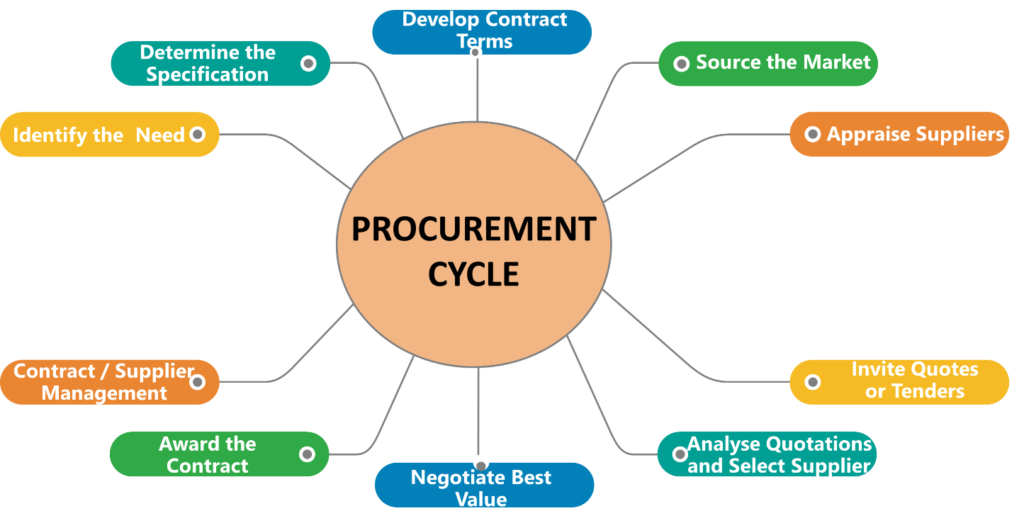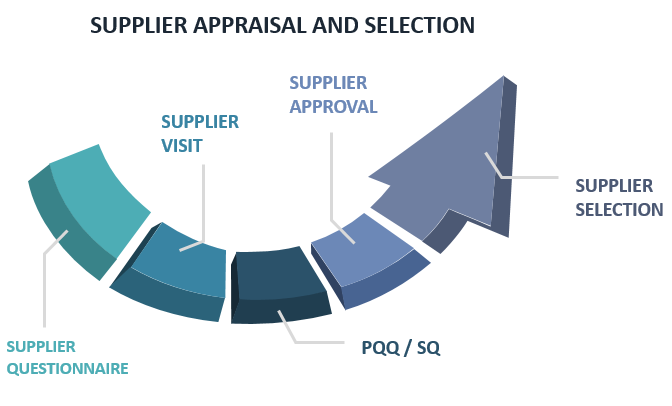Bottom Line Savings through Procurement Part 2
Stage 2, Sourcing – Article 2 of 3

In the previous article Bottom line savings achieved through Procurement we discussed how the Procurement delivers bottom line impact through the pre-Sourcing stages of the Procurement Cycle.
In this article, we will move on to the Sourcing stages of the Procurement Cycle, which represents 7 of the 10 stages and is traditionally seen as the area where Procurement adds its value.
Ironically, we add no more value here than in the 2 stages of pre-Sourcing, or even the final stage post-Sourcing activity. Nonetheless, we still add significant value during the Sourcing stages and furthermore ensure good governance and the prevention of significant risks: Taking the stages in turn:

Develop Contract Terms
In many cases, at this stage, our stakeholders are not interested – they just want the product or service from the supplier. I recall a quick line that I once heard a senior member of I.T. staff say to a colleague. “Oh, Terms and Conditions are easy to resolve, we just use theirs!” – and here lies the problem.
All too often in Procurement we get involved after the event, which is too late – we are already tied in to the Supplier’s Terms and Conditions of Sale (which they are particularly good at and are very robust!). At this stage, we are asked to pull a rabbit out of a hat and somehow get our users out of the photo-copier, Vending Machine, Franking Machine…etc contract they have got themselves tied into for 5 years. Of course on many occasions we just can’t do it. I have seen many of the aforementioned machines, in corners of rooms gathering dust for years. I am sure you will all have a story relating to this. On the positive side, we need to be involved at this stage:
We protect the business, we mitigate all risks. In the Public Sector, the Procurement Team will ensure that you effectively follow the EU Procurement Directives, which will prevent major issues for your organisation.
We think about Total Cost of Ownership for the entire life of the product or service, things like, commissioning, training, energy consumption, maintenance, spare parts, resale value, disposal costs etc.
We do the commercial stuff, which can generate significant savings and income from the contract throughout its life and mitigate risks, clauses such as Title & Property, Liquidated Damages, Retrospective Rebate, Payment Terms, Cost Down, Incentives and Sanctions, Catalogue / Marketing Contribution, Jurisdiction and Exit Strategies.
We think about how the contract is going to be managed to ensure it is delivered effectively, using SLA’s, KPI’s, Balanced Scorecards etc., to allow us to engage in Supplier Performance Management (SPM) and Supplier Relationship Management (SRM). The involvement of Procurement in the development and agreement of Contract Terms and Conditions is absolutely critical.
Source the Market
Our role is to source and provide the right Supplier, we have total ownership for and are only as good as the Suppliers we choose!
If you are a Category Buyer, you should be the most market aware and informed person relating to your category in the organisation. For the Category that you own, you may not be the most technically minded person in the organisation, but you should know all of the key suppliers for that product / service, locally, domestically and internationally from all regions. As an ex buyer of nuts and bolts, I could not go into detail about the mechanical make-up and materials of a bolt, but I could tell you off the top of my head the best 5 suppliers of bolts in Taiwan that could provide products to automotive standards and again this is were our credibility and added value lies.
With regards to sourcing Suppliers, we can find them on our internal system, on the internet, from discussions with colleagues and Suppliers, from Trade Fairs and Exhibitions, which is particularly useful for many reasons, Trade Journals etc.
In the Public Sector, we can use methods such as Request for Information, (RFI’s), OJEU advertisements, Meet the Buyer events etc. to source the market.
Appraise Suppliers
As previously stated, we are only as good as the suppliers we select. If it all goes horribly wrong, it is our fault, not the Quality department’s!
In the Private Sector, especially if it is important, we must undertake a Supplier visit and ideally take a Technical / Quality colleague with you. Following the completion of a comprehensive Supplier Questionnaire in advance, during Far East, India and European visits relating to the Automotive industry, I would always take the technical person with me. At the Supplier entrance, I would go to the boardroom to discuss Commercial aspects and our technical person would ask to go to Goods Inwards and be walked through the entire process through to Goods Outwards, checking the Quality system and full traceability as a minimum. When they joined me in the boardroom some time later, all I would look for is a nod or a head shake. If it is a head shake, I can’t use the Supplier irrespective of any positive discussions that I may have had and vice versa. A visit will also provide you, which a questionnaire will struggle to do, with the softer, but still critical, relationship side to the business. What is the culture like, the mindset of the people, the strategic direction of the organisation – all critical factors. Finally, it will give your mind a visual representation, you will be able to see the factory and the people in your head in future calls, which again is invaluable.
In the Public Sector, due to the need for fairness, traceability and transparency, it is not as easy to visit and assess Suppliers. In this case the Public Sector Procurement team, as part of the process, will ask all Suppliers to complete a Pre-Qualification Questionnaire, (PQQ), or Supplier Questionnaire, (SQ). This is a comprehensive, scored document, assessing the capability of suppliers across many areas, including Sustainability, Social Value, Ethics etc. Suppliers who reach a certain number on the scoring system will move on to the next stage and others will not. Procurement professionals will add huge value here from working with and guiding stakeholders through this stage effectively.

Invite Quotes or Tenders
In the Private Sector this stage varies depending on the circumstances and in most instances Procurement staff and stakeholders are free to make this call. In some instances we will use tenders, some not. In some instances we will engage with our key supply partners only, were the relationship is critical and enter into an element of negotiation only.
In the Public Sector, Procurement professionals will again guide and advise stakeholders through this area, selecting the right process to use, from an Open Tender through to a Competitive Procedure with Negotiation or the creation of a Framework Agreement depending on circumstances. Knowledge, expertise, professionalism and experience will enable the procurement member to add significant value here.
Analyse Quotations and Select Suppliers
This stage is much more prevalent in the Public Sector, where Procurement staff will follow a very specific process, engaging and involving stakeholders to evaluate the tenders against very definite scoring criteria, to ensure that the Most Economically Advantageous Tender, (MEAT) is selected. This will ensure that the process is Transparent, Traceable and Fair and will be able to stand up against any scrutiny in a standstill period or, if any Freedom of Information requests are made, again adding significant value and mitigating risk.
Private Sector organisations, especially in the Finance Sector, may follow similar processes with regards to tender analysis, however generally in the Private Sector, Organisations are not subject to the Freedom of Information Act and in many cases they may just enter into negotiations with their supply partners.
Negotiate Best Value
Procurement has always been recognised as adding value here. This is genuinely an area where we can add immense value to our organisations! Unlike the previous stage, in the Public Sector negotiation is quite a rare occurrence and even then it is a very formalised, structured affair. In an environment of a Competitive Procedure with Negotiation, the meeting will have a number of people present and will be totally minuted to ensure fairness and transparency to all.
In the Private Sector, this area is much more common and less formalised, effectively anything can be negotiated and it is definitely an opportunity for a Procurement Professional to shine in various areas, whilst ensuring that professionalism and ethics are practiced throughout and a sustainable outcome is achieved.
In most instances Procurement Professionals are trained to negotiate and stakeholders are not.
Award the Contract
This should be relatively straight forward but needs to be done correctly. In the Public Sector, Procurement Professionals will follow a very robust and formal approach, preparing a Contract Award Recommendation Report for sign off and the implementation of the contract.
In the Private Sector, we need to ensure that this stage is completed correctly and that all i’s are dotted and all t’s crossed! Again, the thorough conclusion of this stage will add value and mitigate risk for our organisation.
This concludes our discussion on how Procurement delivers bottom line benefits through the Sourcing stage of the Procurement Cycle. In the final article, we will move on to review how we deliver and protect significant value in the Contract Management stage of the Procurement Cycle. Even though it represents one stage only, it’s significance is at least equal to the previous two key stages covered to date.

This article was written by Gary Tinsley FCIPS, BA (Hons), DTLLS, Co Founder of SR Strategic Sourcing Ltd.
For further details and information on Managing your Supplier base and how this can help your organisation please contact us or click through to the following pages
Adding Value though Effective Contract Management in the Public Sector
Generating Social Value from Effective Procurement
Improving your negotiation Skills
Competitive Dialogue – Negotiation in the Public Sector
